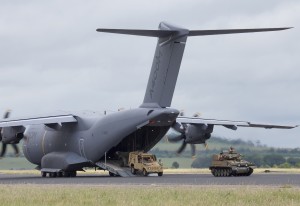2013-07-17 The new A400M airlifter combines a capability to carry oversized equipment similar to a C-17 but deliver it on airfields more like the C-130 can land on.
The ability to deliver significant amounts of equipment or supplies close to the area of operations is a significant development for the airlift fleet.
We argued earlier that:
In the current Mali operation, the French had significant challenges in delivering the capability necessary for their forces.
When the A400M many years ago was first thought of, lift was considered somewhat equivalent to a truck or a greyhound bus.
With the last decade of experience and the revolution in air dropping, the air lifter is an integral part of the kind of expeditionary logistics, which insertion forces clearly need to operate with for 21st century operations.

Recently, Airbus Military tested the ability of the aircraft to offload equipment ready to go with the engines still operating so that rapid departure after offload was facilitated.
According to the Airbus Military press release (July 17, 2013):
In a series of tests at RAF Boscombe Down in the UK, Airbus Military has successfully demonstrated the ability of the A400M new generation airlifter to deploy vehicles and troops rapidly to seize an enemy airfield.
The photo shows a Scimitar armored reconnaissance vehicle, and weapons-mounted support vehicle with trailer exiting an A400M with its engines running to enable it to depart immediately.
The technique is typically used to enable Special Forces to secure a bridgehead airfield so that large quantities of reinforcements and supplies can subsequently be delivered in safety. Up to 60 troops could be deployed simultaneously with the vehicles.
During the Airbus Trade Media event, Ian Elliot, a former UK tanker officer and commander, described how he saw the A400M affecting operations, using the case of the French in Mali:
What the French ended up doing is moving all their equipment in borrowed or chartered strategic airlifters down to the capital, Bamako, which was a long way away from where they actually wanted to use the men and the machinery.
They ended up with massive overland ground convoys. Some of these convoys were hundreds of miles long and this was a 900 km journey.
That involved massive risk. The vulnerability of moving that many people and that much kit by road, but they had no alternative.
Elliott argued that the A400M could have carried all of the core equipment used by the French, and in fewer loads and to areas closer to the operation. This would lead to greater efficiency in the operation and would enhance the speed of operations, and combat speed is a crucial quality for any operation, particularly one like this.
What the UK test underscores is the ability not just to support forces already deployed but to put in place rapidly a tip of the spear force able to anchor follow on operations.
This is obviously a core capability as well for 21st century expeditionary forces.

